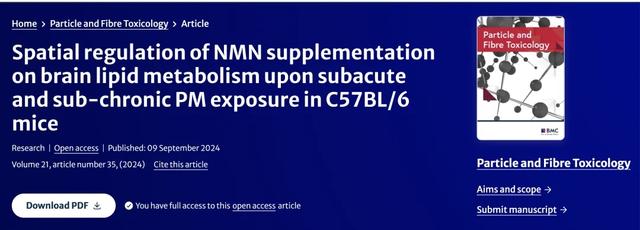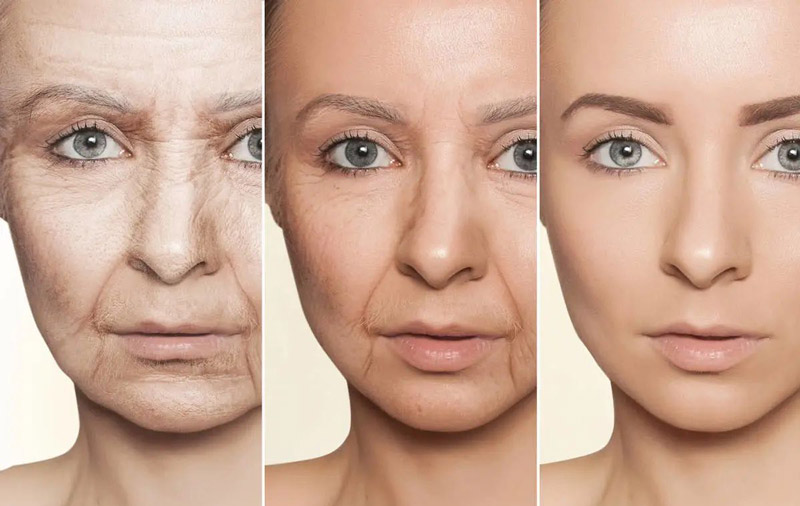Research from Sun Yat-sen University has shown that β-nicotinamide mononucleotide (NMN) can alleviate nerve damage caused by PM2.5, improve brain lipid metabolism, and enhance cognitive and emotional behavior by increasing NAD+ levels, inhibiting microglia activation and reducing inflammation.
Air pollution and brain damage
Fine particulate matter (with an aerodynamic diameter of 2.5 microns (PM2.5) or less) poses a serious threat to human health and is a significant contributor to morbidity and mortality from several diseases.
In addition to infectious respiratory diseases, epidemiological studies have also shown a strong correlation between atmospheric PM2.5 exposure and neurological damage.
Although some studies have found potential interventions such as vitamin supplementation or omega-3 intake to reduce systemic damage and the use of traditional Chinese herbs to reduce cognitive impairment, there is still an urgent need to develop effective interventions for PM exposure.
In September 2024, It was published in Particle and Fibre Toxicology by Jiang Yue et al., Sun Yat-sen University, entitled Spatial regulation of NMN supplementation on brain lipid metabolism upon subacute and sub-chronic PM exposure in C57BL/6 mice suggests that β-nicotinamide mononucleotide (NMN) has a potential protective effect against air pollution-related brain injury.
What is PM2.5?
PM2.5 refers to air pollution particles less than 2.5 microns in diameter, which enter the blood circulation through the alveoli and then affect the brain.
Exposure to PM2.5 triggers oxidative stress and chronic inflammation, a state that can trigger a cascade of neuroinflammation by activating microglia, impairing the function and structure of neurons.
Studies have shown that PM2.5 exposure not only causes acute injuries such as acute stroke, but is also linked to neurodegenerative diseases such as Alzheimer's and Parkinson's disease.
NMN mouse experiment
The study used 120 6-week-old C57BL/6 male mice randomly divided into four groups to receive subacute or subchronic PM2.5 exposure and NMN supplementation through drinking water.
The effects of NMN on PM-induced nerve injury were evaluated, including increasing NAD+ levels, reducing microglial activation, improving lipid metabolism, and inhibiting inflammation.
The study was conducted in a whole-body PM exposure system in Shijiazhuang, where mice underwent behavioral testing, immunohistochemical analysis, mass spectrometry imaging, and RNA sequencing to study region-specific changes in inflammation and lipid metabolism in brain tissue, focusing on key brain regions such as the hippocampus, hypothalamus, and inner capsule.
Experimental result
The results showed that NMN effectively alleviated neuroinflammation and cognitive impairment induced by PM exposure, especially in key brain regions such as hippocampus and hypothalamus.
1. Reduction of systemic inflammation and oxidative stress:
NMN supplementation significantly reduced levels of markers of inflammation (such as IL-6 and TNF-α) and markers of oxidative stress (such as MDA) in PM-exposed mice.
2. Decreased activation of microglia:
In different regions of the brain (such as the hippocampus, hypothalamus, thalamus, and inner capsule), PM exposure resulted in significant activation of microglia, and NMN supplementation significantly reduced this activation, especially under subchronic exposure conditions.
3. Behavioral Improvement:
NMN-supplemented mice showed better motor track and spatial memory abilities in both open field behavior tests and water maze tests, suggesting that NMN has a positive role in alleviating cognitive and emotional impairments induced by PM exposure.
4. Regulation of lipid metabolism:
Mass spectrometry imaging and RNA sequencing analysis showed that lipid metabolism disturbances induced by PM exposure, such as accumulation of triglycerides and lysophospholipids, were significantly improved after NMN supplementation, enhancing cell membrane stability.

Fig.1 Alleviating effects of NMN supplementation on inflammation and oxidation induced by PM exposure. At subacute exposure, NMN supplementation significantly reduced levels of IL-6, TNF-α, and MDA.
Fig.2 (A) Representative image (20x) shows the effect of sub-chronic PM exposure on a specified brain region and zoomed in to show typical microglia morphology in the lower right corner. The number of iba1+ cells in different brain regions was labeled, including (B) the hippocampus, (C) the hypothalamus, (D) the thalamus, and (E) the internal capsule. The results are expressed as mean ± SEM.
Sum up
Overall, the literature investigated the role of β-nicotinamide mononucleotide (NMN) in alleviating nerve damage induced by PM2.5 exposure, and the experimental results showed that NMN supplementation significantly improved lipid metabolism disorders and inflammatory conditions in key brain regions such as the hippocampus and hypothalamus by increasing NAD+ levels, inhibiting microglial activation and reducing inflammatory responses.
The study further confirms the potential of NMN to enhance cognitive and emotional behavior and protect against nerve damage caused by air pollution, revealing its application in future public health interventions.






